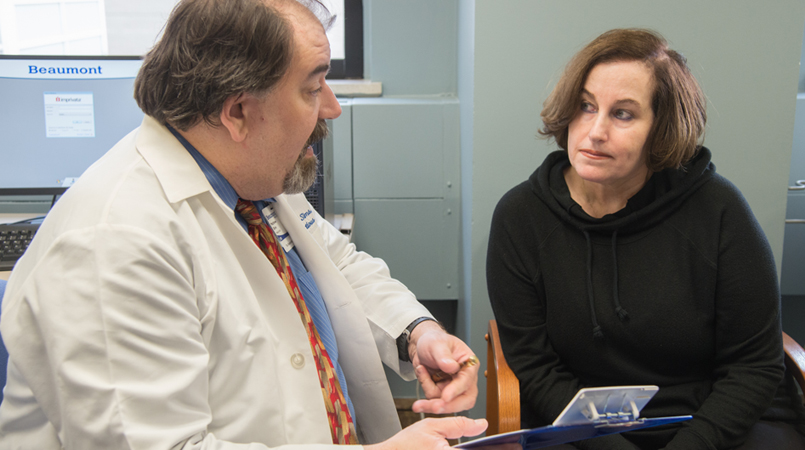
The constant fear of having an embarrassing bathroom accident paralyzed Judy Post. Mental, physical and emotional stress consumed her. She wondered if her life would ever return to normal.
“It was very difficult on me. I kept thinking nothing was going to help me,” Post said. “I was really scared.”
She was diagnosed with a Clostridium difficile infection and was treated for it with vancomycin and got better. However, a few days after she stopped the vancomycin, the diarrhea would come back as the infection relapsed. After talking with several doctors she was directed to Matthew Sims, M.D., Ph.D., associate professor of Internal Medicine at OUWB, director of infectious disease research at Beaumont Hospital, Royal Oak, who enrolled her in a research study and broke the cycle of relapses.
“I had no idea what C. difficile was. My family members hadn’t heard of it, either,” she said.
C. difficile is an infection that causes life-threatening diarrhea. According to an article published in the New England Journal of Medicine, nearly 30,000 people die from C. difficile every year in the United States. Doctors say more than 450,000 are battling the infection. Twelve percent of all hospital-acquired infections are C. difficile.
The Agency for Healthcare Research and Quality recently awarded Dr. Sims with a $2.4 million grant to study a theory that could prevent thousands of C. difficile infections and deaths all over the world. This is one of the largest grants Beaumont Health has ever received.
Some people carry C. diff spores in their colon, but don’t get sick because their good bacteria keeps it in check. However, when C. diff carriers take antibiotics to treat an infection elsewhere in the body, those antibiotics can also kill off the good bacteria.
When good bacteria dies, this removes the restraints on the C. diff and allows it to grow out of control, which causes the person to become sick.
Dr. Sims believes oral vancomycin can keep the C. diff in check when the good bacteria is killed by other antibiotics and should prevent the patient from becoming sick. Participants in the study will be given vancomycin or a placebo along with the antibiotics treating the original infection.
“Treatment with oral vancomycin will not kill the spores. It will not cure people. Patients will still carry the spores in their body. However, the drug should prevent those spores from turning into a full blown C. difficile infection, holding them at bay like the good bacteria would have, and thus prevent the patient from becoming sick,” Dr. Sims said.
The StoP CDI study will test this idea in a randomized, double-blinded, placebo-controlled trial. If successful in demonstrating that vancomycin can prevent the disease, the research could save thousands of lives, stop tens of thousands of infections, and save millions of health care dollars.
Post is not part of the StoP CDI study, but she says the research study she participated in with Dr. Sims was like a miracle that changed her life and she’s eager to see what the new study will find.
“Every day, I become more positive about my life. I still carry a bottle of vancomycin with me, just in case I might need it,” Post said.

